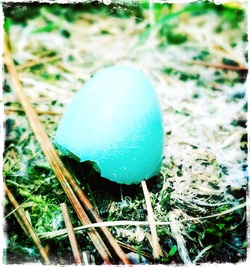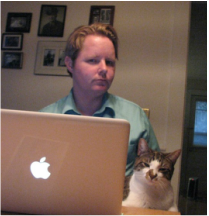ASSAY: A JOURNAL OF NONFICTION STUDIES
2.2
2.2
|
First of all, what’s not to love about an essay called “On the Pleasure of Hating?” As far as awesome titles go, this one’s only approached by Phillip Lopate’s “Against Joie de Vivre.” As a reader, when you see a title like that, all you can really do is blink, raise your eyebrows quizzically, then shrug and say, “Well, okay. I’m listening.” It’s like if someone said to you, “You know what I hate? Orgasms.” You’re pretty sure you’ll disagree with this person, but you’re dying to hear the reasoning behind such an outrageous position.
“Nature seems (the more we look into it),” Hazlitt writes, “made up of antipathies: without something to hate, we should lose the very spring of thought and action. Life would turn to a stagnant pool, were it not ruffled by the jarring interests, the unruly passions, of men.” Without something contemptible to react against, there would see no progress or productivity. We’d simply be filled with an unearned contentment; we’d be the lotus-eaters without the awesome buzz. Our hatreds can motivate us to action—you can’t occupy a lunch counter or protest outside of a police station without first hating the effects of systemic injustice, after all. I have noticed, having taught Hazlitt for years, that people frequently don’t want to agree with Hazlitt’s contention that hating is a pleasurable act, particularly well-intentioned college students and even their bleeding-heart professors. Hatred is a scourge, after all. It’s something we’re trying to eradicate. “Some people might find pleasure in hating,” goes the refrain, “but I—as a liberated, open-minded person—certainly do not, and I don’t think most other people do either.” Yeah? Then explain to me the popularity of reality television in the 21st century, with its Parises and Snookis and Kardahsians, et al. Think about it—these people exist in our culture so that we can hate them. You know it. I know it. And my students inevitably know it too. Oh, sure—many of us have probably decided that these young women (it’s almost always young women, it seems to me) shouldn’t be judged so harshly, and that there’s something a little creepy and misogynistic about our culture’s fascination with—and condemnation of—the things that these women say and do. If you're anything like me, you reached a point—maybe when you saw Paris Hilton's blotchy, tear-streaked face in the back of the police cruiser, or heard that Britney Spears had shaved her head and lost custody of her kids to Kevin Goddamned Federline— that you thought, “Okay—this has gone too far. These are human beings, and we’re hurting them.” Maybe, for a time, you even hated yourself for whatever part you played—as an audience—in their humiliation (“have I not reason to hate and despise myself,” you might have asked, just as Hazlitt did, and the answer, if you’re anything like me, was probably a guilty, “Yeah, kinda.”). Nevertheless, these reality stars—and others like them—are presented to us for our collective loathing. And frequently, we oblige—even if it’s just by laughing when Joel McHale or Jimmy Fallon belittle them. And who among us hasn’t known the pleasure of hating an ill-conceived work of art or self-expression? I must admit that I own a bowling shirt that depicts an image of dogs playing poker—an ironic purchase, to be sure, meant to convey that I am sophisticated enough to know that such a work of “art” is utterly contemptible. A good chunk of my Netflix queue is devoted to movies that I plan to watch only so I can make fun of them. Perhaps more tellingly, I never get tired of letting people know that I thought The West Wing—and, really, series creator Aaron Sorkin’s entire oeuvre—is horribly overrated. And don’t get me started on the films and comic books of Kevin Smith (or his obsessive, defensive fans who think he can do no wrong). If you’ll sit still long enough, I’ll delineate all of the moments of misogyny, weak characterization, uninspired camera shots, and lazy plotting to be found in movies like Chasing Amy and Clerks. If you’ll let me, I’ll even tell you why I think Quentin Tarantino hasn’t made a genuinely good movie since Jackie Brown, despite the accolades earned by Django Unchained and Kill Bill. If I’m honest with myself, I have no reason to give this much thought to pop culture that fails to enthrall me—it’s not like the lead singer of Maroon 5 or the executive producer of The Big Bang Theory came over to my house to steal my wallet and kick my cat on their way out. But I have to be honest—I enjoy hating things that suck. A lot. As Hazlitt wrote, “We grow tired of every thing but turning others into ridicule, and congratulating ourselves on their defects.” One of the main objections some people—and even this person, once upon a time—have to Hazlitt’s essay is the knowledge (so eloquently expressed by James Baldwin in “Notes of a Native Son”) that hatred consumes and destroys people. “Sure, anger is useful and important,” these people can say, “but you have to guard against being hateful, otherwise you destroy yourself.” I do believe that’s true, but I also don’t think that truth negates Hazlitt’s point that hating can feel quite good. Lots of stuff that is bad for can feel good-- Chocolate. Cocaine. Adultery. Something can be wrong—personally destructive, even—and still feel good, even if—perhaps especially if—we try to deny its appeal. But it’s worth noting that Hazlitt does not advocate being hateful. He advocates hating—in appropriate measure. Hazlitt tells us: The echoes of liberty had awakened once more in Spain, and the mornings of human hope dawned again: but that dawn has been overcast by the foul breath of bigotry, and those reviving sounds stifled by fresh cries from the time-rent towers of the Inquisition – man yielding (as it is fit he should) first to brute force, but more to the innate perversity and dastard spirit of his own nature which leaves no room for farther hope or disappointment. As I’ve gotten older, I’ve come to believe that people often mistake the pleasure of hating with virtue. It can feel so damn good to believe that some forms of sexuality are abominations, or that some ethnicities are naturally lazier than others, or that all Republicans are monsters who want to eat the poor. We take so much pleasure in being certain that we are right, and that others are wrong. If others weren’t so stupid, or blind, or sinful, they would see things as I do, we tell ourselves sometimes. And we bask in the feeling of moral or spiritual superiority. It feels so damn good.
Hazlitt’s essay, I think, is a reminder that hating’s pleasure is something distinct from virtue, but when I read it, I can’t help but hope that, perhaps, we might be willing to use this pleasure towards more useful ends. If we could channel our hatred towards injustice, poverty, world hunger—situations, rather than individuals—it seems to me we could enjoy both the pleasures of hating and have a positive impact on the world. I don’t want to sound like a hippie, or to issue simple minded platitudes—“Hate the sin but love the sinner” or “I’m only intolerant of intolerance” or anything like that. But I do feel like if we could channel our hatred towards the institutions that perpetuate the problems that vex us, and away from the people who are either agents or victims of those institutions, perhaps we could hate productively, and earn the sense of satisfaction and pleasure that comes along with hating. I believe this with all of my heart. I also know that I’m nowhere close to reaching this ideal. I still find myself hating certain people—the political pundit who jokes about whether or not black lives matter, the presidential candidate who wants to build a wall around America to keep out the brown people, a minister I used to know who told a young single mother “God’s not mad at your baby—he’s just mad at you.” Good Lord, does it ever feel good to hate these people. Yet it also alarms me, how quickly such hatred comes over me, how easily it overwhelms me, how I glow in this unearned self-satisfaction, in my darker moments. If I try, I can usually talk myself out of my hatred—I can remind myself that these are my fellow human beings. That very few people are actually trying to hurt others. That surely I have my own intellectual and moral blindspots as well, and that I should not delude myself into thinking I am any better than anyone else. “[H]ave I not reason to hate and despise myself?” Indeed I do; and chiefly for having hated and despised the world too much, at times. I realize this, in my better moments. And then, after a short respite, I move on to the next object of loathing. |
Click here to download a printable PDF with Works Cited.
Related Works
|
Ned Stuckey-French
Our Queer Little Hybrid Thing 1.1 Articles |
Ioanna Opidee
Essaying Tragedy 2.1 Pedagogy |
Mike Puican
Narrative Disruption in Memoir 2.1 Conversations |

